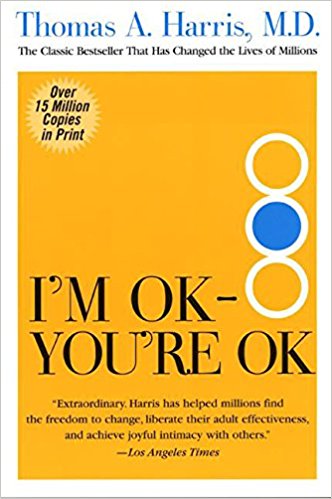“Since sin is deeper than bad behavior, trying to do better isn’t a solution. Only grace that changes the heart can rescue us.”
Paul David Tripp
I’ve been challenged again by Paul David Tripp in his New Morning Mercies — a Daily Gospel Devotional. I grew up in the age of “I’m ok, You’re ok” , the best selling self-help book offering transformation through transactional analysis. I grew up in a country with a “can do” attitude. I was taught in a framework of performance-based education. I currently live in a country where tolerance is one of the top values. I often catch myself unconsciously viewing life from the trenches carved by these influential streams of thought.

This reactive natural response flies in the face of the Gospel-centered words of Tripp:
“There is a difference between a person in whom disappointment leads to self-reformation and someone in whom grief leads to heartfelt confession. The first person believes in personal strength and the possibility of self-rescue, while the second has given up on his own righteousness and cries out for the help of another.”
How many times have I hurt someone or made a blunder or didn’t prayerfully think a course of action through, ending up with a backlash. This would leave me with a pit in my stomach, but with plenty of self-preservation to pick myself up, comfort myself, rationalize, justify, and plan a course of action to avoid that again. There it is, self-improvement combined with self-protection. Ugh! Tripp states it well…
“Self-reliant personal reformation and the penance that follows is the polar opposite of heartfelt confession with the repentance that follows. People who acknowledge that what they have done is wrong and then immediately lay out plans to do better unwittingly deny what the gospel of Jesus Christ says about them, how real life change takes place, and where help can be found. What they have neglected is confession. When you confess your sins to God, you don’t just admit that you have sinned; no, you also confess that you have no power to deliver yourself from the sin you have just confessed. True confession always combines an admission of wrong with a plea for help. The heart, then, encouraged by the forgiveness and presence of Jesus, longs to live in a new, better way (repentance).”
Now, to be honest, not only was confession not promoted in the predominantly self-actualization affirming culture that surrounded me, but neither was the non-politically-correct word, “sin“. I remember not even understanding what salvation was all about as a young teen. Saved from what? Thank the Good and merciful God, some Biola students explained it to me when I was in junior high, during a visit to my beloved Aunt Velma. Now perhaps there was someone at the Methodist church I was confirmed at that tried to explain it, but it didn’t make sense to me somehow. Perhaps my abstract thinking wasn’t matured enough. Tripp challenges further by stating:
“A person who manifests a self-reliant recognition of wrong assigns to himself the power to do better and then gives himself to spiritual-looking acts of penance that make him feel good about himself and his potential ability to do better.”

Wow! I can so identify this in my own heart and inner dialogue over the years. Even in the Christian world, we seem to have pendulum-shifted from the “fire and brimstone” eras to the universalistic view that God’s love is for all no matter what we do. It is true, Biblically, that God so loved the world that He gave His only begotten Son, so that whoever believes in Him shall not perish but have everlasting life. (John 3:16) But that refers to salvation, not sanctification, i.e. our spiritual transformation from death to life.
I understood in my early twenties that I had first believed in God, the Savior, but trusting Him as Lord of my life was a much more painful dying-to-self and intentional choice. When I was little, I thought of God like the kind-hearted Santa Claus. In the midst of teenage years I understood him as my Savior giving me a ticket to heaven, but when my ways of trying to make life work didn’t prove successful, I realized that He was calling me to trust Him wholly with my everything, and stop trying to do it on my own. But self-reformation is not an easy addiction to overcome when all the messages around us promote that false thinking, and the sin within so beguilingly deceives.
Are there many of us running ragged, serving, serving, serving in a sort of “make up for it” kind of penance? Or simply thinking, well I’m not so bad especially compared to others. The sad part of this is that rarely is there lasting change. “It never produces a protective and preventative humility of heart. It never stimulates further worship and service of the Savior. It simply does not work. If you had the power to change yourself without God’s help, Jesus wouldn’t have had to come. The whole story of the gospel in Scriptures is a story of people who are desperately trapped in sin and have no hope except the rescuing grace of the Redeemer.”
Check out Luke 18:9-14
What is your path to transformation? Are you a submitted humble repentant or a self-reformer? May we all choose the path of the Redeemer – it truly is the better way.
I would like to personally thank my daughter for giving me this devotional book and for modeling a grace directed life. I am humbled and thankful you are not just my daughter but my sister in Christ. I love you.
